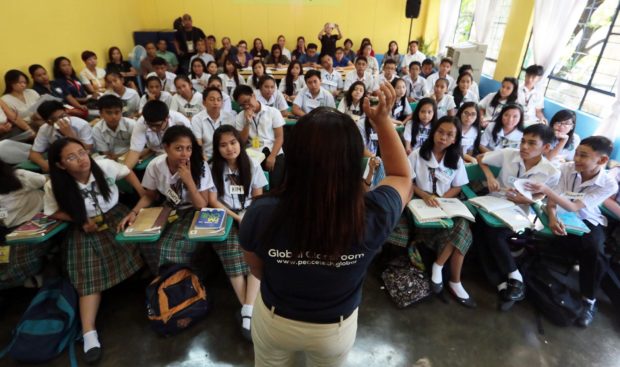MANILA, Philippines — Girls in the Philippines and three other countries “do better than boys” in mathematics, a report by the United Nations Educational, Scientific and Cultural Organization (Unesco) showed.
A new publication by the Unesco’s Global Education Monitoring Report found that the gender gap favouring boys in early grades is gradually disappearing.
The Unesco report, which was released on April 27, analyzed data in the primary and secondary education of 120 countries.
“Some countries even saw girls do better than boys in maths,” the UN said in a statement, citing Unesco’s report.
Unesco’s findings showed that “boys perform better than girls in mathematics in the early years.”
However, this gender gap “disappears later.”
“This research confirms that the gender gap in learning has closed even in the poorest countries. And in some countries, the gap is now reversed,” Unesco said in a separate statement.
“For example, by grade 8, the gap is in favour of girls in mathematics by 7 percentage points in Malaysia, by 3 points in Cambodia, by 1.7 points in Congo and by 1.4 points in the Philippines,” it added.
Despite this, Unesco said “biases and stereotypes are still likely to affect learning outcomes.”
“Even though girls catch up in mathematics in upper primary and secondary education, boys are far more likely to be overrepresented among the highest performers in mathematics in all countries,” Unesco pointed out.
“In middle- and high-income countries, girls in secondary school are scoring significantly higher in science,” it added.
Unesco, however, said girls are still less likely to pursue careers in science. This, according to the UN body, indicates that “gender biases could still be obstacles to the pursuit of further education in the science, technology, engineering and mathematics (STEM) fields.”
Reading
The Unesco report, meanwhile, found that girls “perform even better in reading.”
“More girls achieve minimum proficiency in reading than boys,” it said.
It pointed to Saudi Arabia, where Unesco found the “largest gap” in primary education wherein 77 percent of the girls achieved minimum proficiency in reading, higher than the 51 percent of boys who were able to do so.
Meanwhile, girls in Thailand “outperform” boys in reading by 18 percentage points, in the Dominican Republic by 11 points and 10 points in Morocco, according to Unesco.
“Even in countries where girls and boys are at the same level in reading in the early grades, as in Lithuania and Norway, the gap in favour of girls rises to roughly 15 percentage points by age 15,” it added.
Malala Yousafzai, who was shot by the Pakistani Taliban in 2012 for advocating for girls’ education, stressed the need to give girls a chance to have access to learning.
“Girls are demonstrating how well they can do in school when they have access to education. But many, and particularly the most disadvantaged, are not getting the chance to learn at all. We shouldn’t be afraid of this potential,” Yousafzai was quoted as saying in the Unesco statement.
“We should feed it and watch it grow. For example, it’s heartbreaking that most girls in Afghanistan do not have the opportunity to show the world their skills,” she added.
Meanwhile, Unesco’s Global Education Monitoring Report director Manos Antoninis recognized that “more data is needed” to get a global picture of gender gaps in education.
Unesco noted that most of the data analyzed for the report “have been released in the last 18 months but refer to the situation just before the pandemic struck.”
“Although more data is needed, recent releases have helped paint an almost global picture of gender gaps in learning outcomes right before the pandemic. Girls are doing better than boys in reading and in science and are catching up in mathematics,” Antoninis said.
“But they are still far less likely to be top performers in mathematics because of continuing biases and stereotypes. We need gender equality in learning and ensure that every learner fulfils their potential,” he added.
